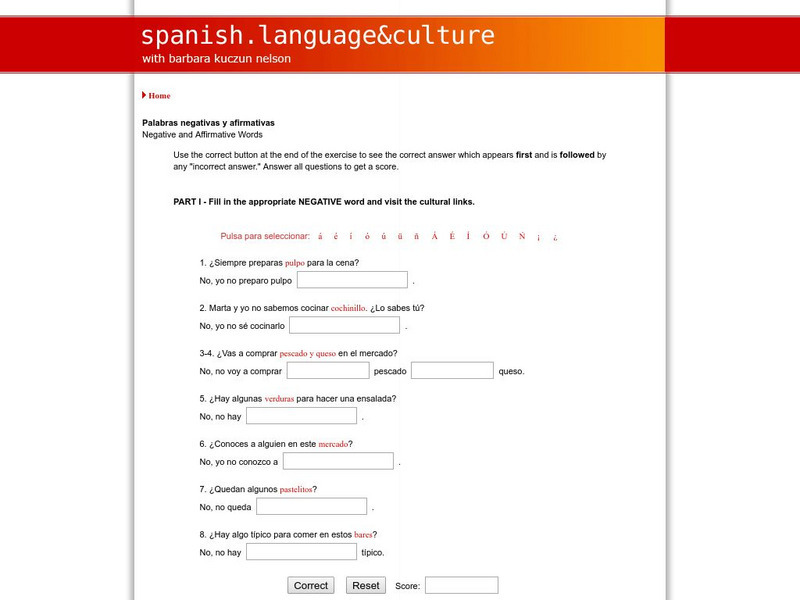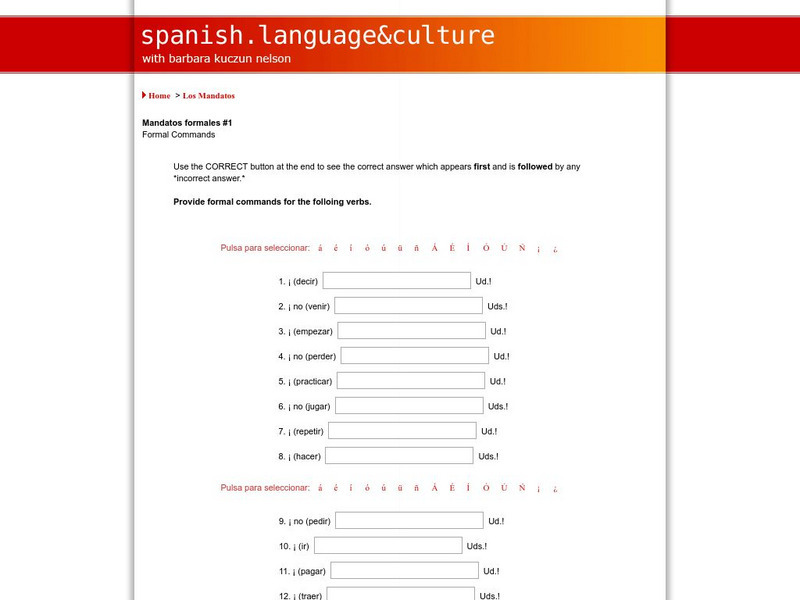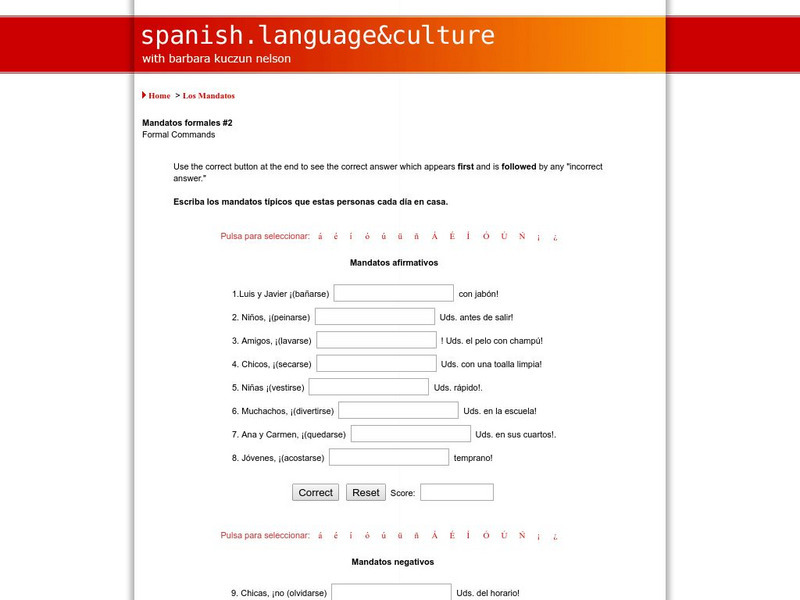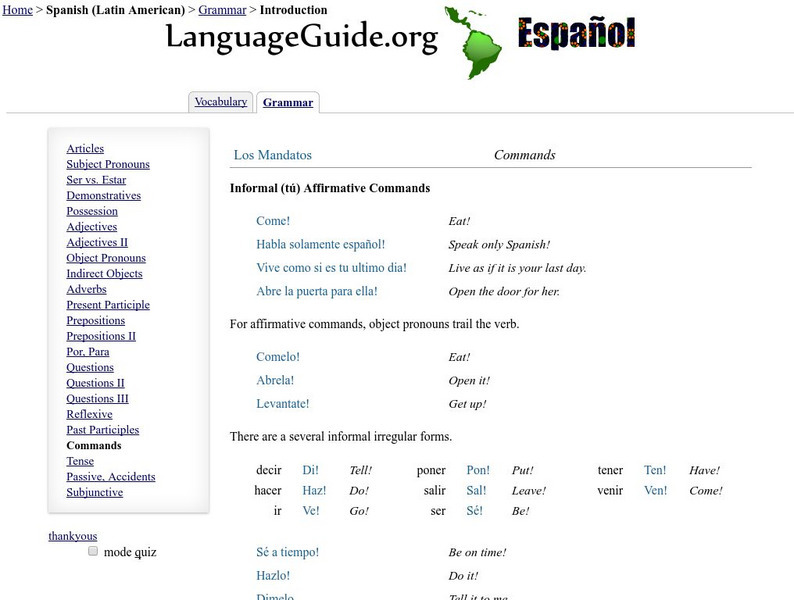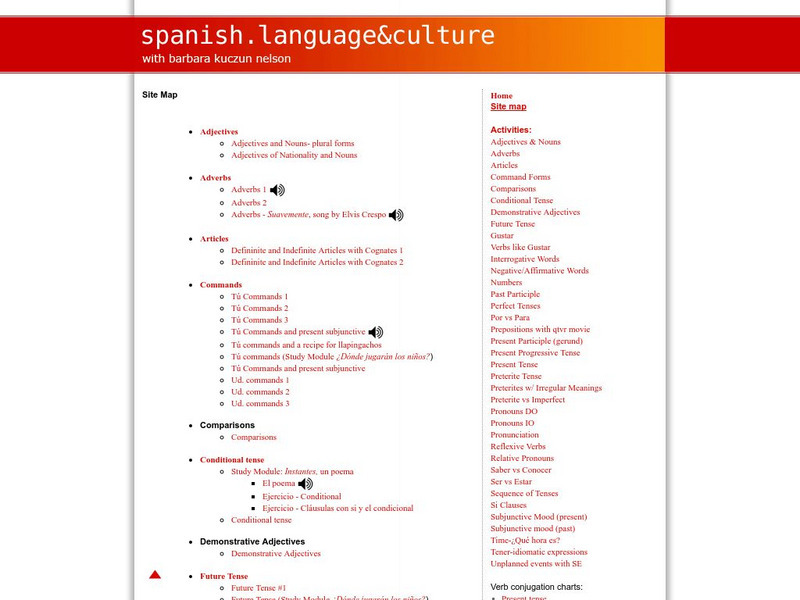Hi, what do you want to do?
Colby College
Spanish Language & Culture: Informal Commands (Part 2)
Practice answering questions with affirmative and negative tu commands and direct and indirect object pronouns. Stem-changers, spelling changes, regular and irregular command forms are included in this exercise.
Study Languages
Study Spanish: Using Object Pronouns With Commands
Great lesson on using object pronouns with affirmative and negative command forms. A quiz at the end of the lesson tests the student's mastery of this grammar principle.
Study Languages
Study Spanish: Direct Object Pronouns Part Ii
This site has an introduction to the concept of direct objects and their pronouns, that focuses on their use in affirmative and negative sentences. Ample examples illustrate the formation and placement of direct object pronouns. Young...
Colby College
Spanish Language & Culture: Negative and Affirmative Words
Colby College offers a fill in the blank exercise that gives the user practice in determining which negative or affirmative word to use. Photos of new food vocabulary words are also accessible by clicking on the underlined word.
Other
Bloomsburg University: Lincoln Douglas and Team Debate Formats
Dr. Tomlinson provides basic outlines of the two most prominent debate formats including time limits and the characteristics of each phase of the debate.
Colby College
Spanish Language & Culture: Informal Commands (Part 1)
Practice forming affirmative and negative tu commands with reflexive pronouns in this Spanish tutorial. Infinitives are provided as cues for the exercise as well as stem-changers, spelling changes, and regular and irregular command forms.
Colby College
Spanish Language & Culture: Formal Commands (Part 1)
Practice changing 25 infinitives to affirmative and negative usted and ustedes commands. Stem-changers, spelling changes, regular and irregular formal commands are included in this Colby College exercise.
Colby College
Spanish Language & Culture: Formal Commands (Part 2)
Practice changing 16 reflexive verb infinitives to affirmative and negative usted and ustedes commands. Stem-changers, spelling changes, regular and irregular formal commands are included in this exercise.
Study Languages
Study Spanish: Informal Commands (Vosotros)
Excellent Spanish lesson on informal plural commands that refer to the pronoun "vosotros." Examples illustrate the formation and use of informal vosotros commands in both the negative and the affirmative. A quiz at the end of the lesson...
Language Guide
Language Guide: Los Mandatos
Formation of informal commands, regular and irregular forms are addressed with links to interactive practice activities. In addition, the formation of formal commands are explained with a link to interactive practice activities. A couple...
Other
Debate Central: Learn About Debating
This web site has debate information on how to debate, how to judge, how to coach, how to be a better speaker and how to research.
Colby College
Spanish Language & Culture
Colby College provides a large collection of exercises on adjectives, adverbs, numbers, prepositions, clauses, study modules, and more.
Study Languages
Study Spanish: Informal Commands (Tu)
Excellent introduction to informal commands in Spanish that use the pronoun tu. Ample examples illustrate the formation and use of informal commands in both the negative and the affirmative. A quiz at the end of the lesson tests the...
Study Languages
Study Spanish: Commands Review Part 1
Great review of regular and irregular command forms for the pronouns tu and usted. A quiz at the end of the lesson tests the student's mastery of these informal and formal command forms.
Study Languages
Study Spanish: Irregular Commands (Tu)
Great introduction to irregular affirmative commands in Spanish that use the pronoun tu: decir, hacer, ir, poner, salir, ser, tener, and venir. A quiz at the end of the lesson tests the student's mastery of these irregular command forms.
Sophia Learning
Sophia: Arguments in Action: Mini Debates
This PDF lesson plan provides young scholars the opportunity to practice the use of logic within a debate structure. Students are given controversial debatable topics, prepare for the debate, and hold mini-debates.








